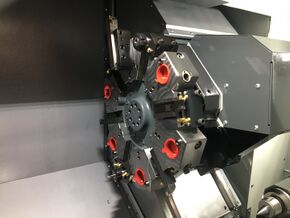Haas ST-15Y: Difference between revisions
| Line 25: | Line 25: | ||
=== [[Hydraulic 3-Jaw Chuck|Workholding - Hydraulic 3-jaw chuck]] === | === [[Hydraulic 3-Jaw Chuck|Workholding - Hydraulic 3-jaw chuck]] === | ||
If you wish to work with a part or stock larger than 65mm you will need to use the hydraulic three-jaw chuck. This uses three jaws to hold on to stock, and can have custom machined "soft jaws" fitted to ensure an exceptionally good fit on both raw stock and finished surfaces. | If you wish to work with a part or stock larger than 65mm you will need to use the hydraulic three-jaw chuck. This uses three jaws to hold on to stock, and can have custom machined "soft jaws" fitted to ensure an exceptionally good fit on both raw stock and finished surfaces. | ||
=== [[Centres and Centre Drilling (Haas ST-15Y)|Workholding - Centres and Centre Drilling]] === | |||
Long work - more than 4 to 5 times their diameter - will need additional support when cutting. You can do with with the hydraulically actuated tailstock and a live centre inserted into a specially drilled hole on the end of the bar. | |||
=== [[Threading (Haas ST-15Y)|Threading]] === | === [[Threading (Haas ST-15Y)|Threading]] === | ||
Revision as of 17:23, 15 December 2023
| This placeholder article needs more information adding to it. More details are coming soon, if you can please ask the technical staff for a wiki account and help out. |
 | |
| C-axis live tool CNC lathe. | |
| Equipment Information | |
|---|---|
| Status | Unknown |
| Manufacturer | Haas |
| Model | ST-15Y |
| Working Area | Ø240 mm x 400 mm |
| Maker Space Information | |
| Training Required | Yes |
| Training Information | Here |
In a lathe the material of the workpiece spins and the tool remains stationary - a piece of sintered tungsten carbide is then used to peel away material where it isn't wanted. If you need to produce parts which are primarily round this is the machine you should probably be using. This particular machine has a Y axis and live tooling capability which expands the possibilities even more by allowing work to take place off the spindle axis, and perpendicular to it as well.
Actually programming the machine is relatively easy using Fusion 360. We have a number of programming templates in the works which will automate the majority of the process. The (slight) difficulty is in the form of loading the tools in a manner that allows access to all of the work area without colliding with the chuck or another part of the machine enclosure.
Training
Ask a member of technical staff about training for this machine.
Usage information
Workholding - Collets
The lathe usually has a collet chuck installed. This is an easy-to-use way to hold on to bar stock under 65mm in diameter. Check this page for how to change collets and order new sizes.
Workholding - Hydraulic 3-jaw chuck
If you wish to work with a part or stock larger than 65mm you will need to use the hydraulic three-jaw chuck. This uses three jaws to hold on to stock, and can have custom machined "soft jaws" fitted to ensure an exceptionally good fit on both raw stock and finished surfaces.
Workholding - Centres and Centre Drilling
Long work - more than 4 to 5 times their diameter - will need additional support when cutting. You can do with with the hydraulically actuated tailstock and a live centre inserted into a specially drilled hole on the end of the bar.
Threading
Excellent quality threads can be made on the lathe, but it is a little involved compared to simply running a tap through a hole. This page will guide you through some of the maths requried to create excellent threads using single-point cutting tools.
Troubleshooting
A few issues crop up repeatedly. If you're having trouble with the lathe check this page to see if it's something we've come across before.

